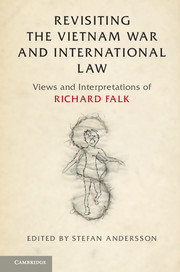Book contents
- Frontmatter
- Dedication
- Contents
- Foreword: The Harmful Legacy of Lawlessness in Vietnam
- Preface
- Acknowledgments
- PART I THE US ROLE IN VIETNAM AND INTERNATIONAL LAW
- PART II WAR AND WAR CRIMES
- PART III THE VIETNAM WAR AND THE NUREMBERG PRINCIPLES
- 9 The Nuremberg Defense in the Pentagon Papers Case
- 10 A Nuremberg Perspective on the Trial of Karl Armstrong
- 11 Telford Taylor and the Legacy of Nuremberg
- PART IV THE LEGACY OF THE VIETNAM WAR
- Index
9 - The Nuremberg Defense in the Pentagon Papers Case
from PART III - THE VIETNAM WAR AND THE NUREMBERG PRINCIPLES
Published online by Cambridge University Press: 28 December 2017
- Frontmatter
- Dedication
- Contents
- Foreword: The Harmful Legacy of Lawlessness in Vietnam
- Preface
- Acknowledgments
- PART I THE US ROLE IN VIETNAM AND INTERNATIONAL LAW
- PART II WAR AND WAR CRIMES
- PART III THE VIETNAM WAR AND THE NUREMBERG PRINCIPLES
- 9 The Nuremberg Defense in the Pentagon Papers Case
- 10 A Nuremberg Perspective on the Trial of Karl Armstrong
- 11 Telford Taylor and the Legacy of Nuremberg
- PART IV THE LEGACY OF THE VIETNAM WAR
- Index
Summary
INTRODUCTION
The most celebrated case brought by the United States Government against domestic opponents of the Vietnam War arose out of the release in 1971 of major portions of the so-called Pentagon Papers by Daniel Ellsberg and Anthony Russo. As is generally known, the Government's misconduct in United States v. Russo eventually led to the dismissal of the charges. As a consequence, important questions concerning the application of international criminal law embedded in the litigation were never resolved, although interim rulings by Judge Matthew Byrne suggested their disposition at the trial level. In particular, the defendants Ellsberg and Russo tried to argue that the disclosure of the Pentagon Papers was a reasonable and effective method of terminating their complicity with a war conducted in violation of international law.
International law imposes criminal liability for complicity in crimes against the peace. It is arguable that this potential liability of Americans has been officially recognized as part of the American law. Hence, fairness to potential defendants makes it essential that they be allowed to rely upon any defense that arises out of their accountability under international law standards. In addition, the substantive merits of international criminal law make it desirable to encourage national implementation, including a recognition that individual action undertaken to prevent the consummation of international crimes should be accorded precedence over conflicting dictates of national law.
This article will examine these issues in the context of United States v. Russo. I shall show that the released portion of the Pentagon Papers contained strong evidence supporting a reasonable belief that the United States had pursued and was continuing to pursue a Vietnam policy which violated international law; and that the defendants, Ellsberg and Russo, could reasonably infer that they were accessories to the commission and execution of public policies in violation of international law. Furthermore, I will argue that the defendants could have been internationally indicted for these acts in accordance with precedents established by the Allied prosecutions of German citizens following World War II. Therefore, by partially disclosing the contents of the Pentagon Papers the defendants, I would contend, were making a reasonable effort to terminate their complicity in such illegal acts. Furthermore, the “superior orders” dictated by domestic law to prohibit the disclosure of such information would not act as a bar against international prosecution or conviction based on alleged violations of international criminal law.
- Type
- Chapter
- Information
- Revisiting the Vietnam War and International LawViews and Interpretations of Richard Falk, pp. 257 - 286Publisher: Cambridge University PressPrint publication year: 2017



